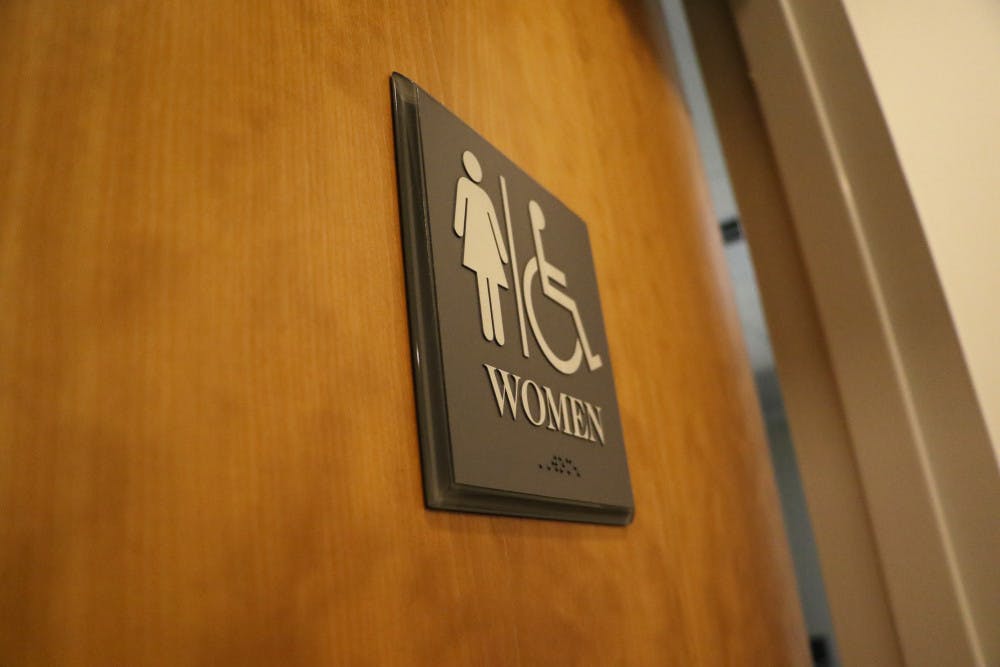There is a push at Seton Hall University for an initiative that would put feminine hygiene products in the women’s bathrooms on campus.
[caption id="attachment_25273" align="aligncenter" width="838"] Jill Cancela / Staff Photographer[/caption]
Student Government Association (SGA) Senate Secretary Alyssa Futa, a sophomore studying diplomacy and international relations and modern languages, said, “There are a number of social movements that are targeted at providing free feminine hygiene products in public places. While Seton Hall University is not a public university, we thought it was worth it to try and bring this movement to Seton Hall.”
“It can be difficult to obtain any feminine hygiene products if [students] are on-campus after the University Bookstore, which, I believe, is the only place on-campus that sells feminine hygiene products, closes,” Futa continued.
The initiative would focus on supplying students with the products they need in an emergency.
“[W]e are not trying to provide free feminine hygiene products to all students who menstruate so that they don’t have to buy products, but if there is an instance where they need a product immediately, at least there is something accessible to them,” Futa said.
Colleges across the United States already provide feminine hygiene products; at some universities, these products can be found free of charge in any bathroom, regardless of gender. In 2016, Brown University became one of the first big-name universities in the country to offer tampons and pads for free in campus bathrooms, according to Time.
Many universities are now supplying feminine hygiene products. However, Catholic universities, Seton Hall University included, seem to fall behind the curve.
Delilah Gutierrez, a junior studying diplomacy and international relations, said, “I think it [providing feminine hygiene products in bathrooms on campus] is a pretty good idea.” She added that while she commutes, she always carries extra pads with her in case of an emergency for “the girl in the bathroom.”
“I think [this initiative] is a good idea,” Melinda Primorac, a freshman theatre and political science major, said. “I’m surprised that they don’t have that already.”
When asked why she was surprised at the lack of feminine hygiene products in Seton Hall’s bathroom, Primorac said, “Even my public high school had [feminine hygiene] dispensers.”
But this initiative at Seton Hall is still in its early stages.
“We are reaching out to other universities that have a similar demographic to Seton Hall University to see if they have a similar program and inquire about these programs further to help determine what will work best for Seton Hall in the event that we do establish this program,” Futa said.
The details of the initiative still need to be hammered out. “We have yet to discuss the logistics of this program. We are still in a preliminary research phase, so our logistics will likely be determined once we finish our research,” Futa said.
Marie Leone can be reached at marie.leone@student.shu.edu.
Jill Cancela / Staff Photographer[/caption]
Student Government Association (SGA) Senate Secretary Alyssa Futa, a sophomore studying diplomacy and international relations and modern languages, said, “There are a number of social movements that are targeted at providing free feminine hygiene products in public places. While Seton Hall University is not a public university, we thought it was worth it to try and bring this movement to Seton Hall.”
“It can be difficult to obtain any feminine hygiene products if [students] are on-campus after the University Bookstore, which, I believe, is the only place on-campus that sells feminine hygiene products, closes,” Futa continued.
The initiative would focus on supplying students with the products they need in an emergency.
“[W]e are not trying to provide free feminine hygiene products to all students who menstruate so that they don’t have to buy products, but if there is an instance where they need a product immediately, at least there is something accessible to them,” Futa said.
Colleges across the United States already provide feminine hygiene products; at some universities, these products can be found free of charge in any bathroom, regardless of gender. In 2016, Brown University became one of the first big-name universities in the country to offer tampons and pads for free in campus bathrooms, according to Time.
Many universities are now supplying feminine hygiene products. However, Catholic universities, Seton Hall University included, seem to fall behind the curve.
Delilah Gutierrez, a junior studying diplomacy and international relations, said, “I think it [providing feminine hygiene products in bathrooms on campus] is a pretty good idea.” She added that while she commutes, she always carries extra pads with her in case of an emergency for “the girl in the bathroom.”
“I think [this initiative] is a good idea,” Melinda Primorac, a freshman theatre and political science major, said. “I’m surprised that they don’t have that already.”
When asked why she was surprised at the lack of feminine hygiene products in Seton Hall’s bathroom, Primorac said, “Even my public high school had [feminine hygiene] dispensers.”
But this initiative at Seton Hall is still in its early stages.
“We are reaching out to other universities that have a similar demographic to Seton Hall University to see if they have a similar program and inquire about these programs further to help determine what will work best for Seton Hall in the event that we do establish this program,” Futa said.
The details of the initiative still need to be hammered out. “We have yet to discuss the logistics of this program. We are still in a preliminary research phase, so our logistics will likely be determined once we finish our research,” Futa said.
Marie Leone can be reached at marie.leone@student.shu.edu.





